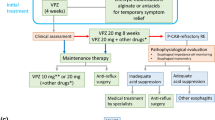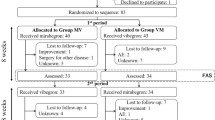Abstract
Fifty-four patients with endoscopically documented therapy-resistant erosive reflux esophagitis were treated with lansoprazole, a new proton pump inhibitor, for up to 12 weeks. Prior to entry, all had remained unhealed after treatment with at least two histamine2-receptor antagonists, at therapeutic doses or higher, for at least 12 weeks. Patients were randomized to receive either 30 or 60 mg lansoprazole once daily. Endoscopy was performed and symptoms assessed at weeks 2, 4, 6, 8, and 12. Fifty-nine percent of the 50 evaluable patients were healed (ie, no evidence of erosions) after only two weeks of lansoprazole. Cumulative endoscopic healing rates were 82% and 92% by week 4 and week 8, respectively, and the two doses were equally effective in healing. The 30- and 60-mg doses effected a decrease in the overall symptom score from 5.30 and 4.85 to 2.35 and 1.67, respectively, by the final treatment visit (P=0.001). No clinically significant adverse events or changes in laboratory parameters were observed, and no patients withdrew prematurely from the study. This study demonstrates that lansoprazole therapy is highly effective in healing erosive reflux esophagitis resistant to therapy with histamine H2-receptor antagonists.
Similar content being viewed by others
References
Sontag SJ: The medical management of reflux esophagitis. Role of antacids and acid inhibition. Gastroenterol Clin of North Am 19(3):683–712, 1990
Hetzel DJ, Dent J, Reed WD, Narielvala FM, Mackinnon M, McCarthy HJ, Mitchell B, Beveridge BR, Laurence BH, Gibson GG, Grant AK, Shearman DJC, Whitehead R, Buckle PJ: Healing and relapse of severe peptic oesophagitis after treatment with omeprazole. Gastroenterology 95:903–912, 1988
Sontag SJ, Hirschowitz BI, Holt S, Robinson MG, Behar J, Berenson MM, McCullough A, Ippoliti AF, Richter JE, Ahtaridis G, McCallum RW, Pambianco DH, Vlahcevic RZ, Johnson DA, Collen MJ, Lyon DT, Humphries TH, Cagliola A, Berman RS: Two doses of omeprazole versus placebo in symptomatic erosive esophagitis. The U.S. Multicenter Study. Gastroenterology 102:109–118, 1992
Sugiyama M, Ishikawa T, Aoki T, Kashiwagi H, Watanabe Y, Sasaki H, Yoshino K: Effect of lansoprazole (AG-1749) on gastric acidd secretion—inhibition of insulin-stimulated acid secretion. Shokakika 14(2):183–193, 1991
Hogan DL, Koss MA, Feitelberg S, Hussein Z, Karol MD, Isenberg JI: Single and repetitive administration of lansoprazole: Effects on gastric acid secretion, pharmacokinetics and serum gastrin in old vs young subjects. Gastroenterology 100:A84, 1991 (abstract)
Matsuo Y, Takemoto T, Miwa T, Iwasaki A, Asaoka A: Clinical study of the inhibitory effect of AG-1749, a proton pump inhibitor, on nocturnal gastric acid secretion: Evaluation of dosage and administration stage. Yakuri to Chiryo 18:4865–4876, 1990
Barradell LB, Faulds D, McTavish D: Lansoprazole. A review of its pharmacodynamic and pharmacokinetic properties and its therapeutic efficacy in acid-related disorders. Drugs 44(2):225–250, 1992
Hatlebakk JG, Berstad A, Carling L, Suedberg L-E, Unge P, Ekstrom P: Lansoprazole vs omeprazole in short-term treatment of reflux esophagitis. Results of a Scandinavian multicentre trial. Gastroenterology 102:A80, 1992 (abstract)
Savary M, Miller G: Der Oesophagus. Solothrun, Gasmann, 1977
Klinkenberg-Knol EC, Jansen JBMJ, Lamers CBWH, Nelis F, Snell P, Meuwissen SG: Use of omeprazole in the management of reflux oesophagitis resistant to H2-receptor antagonists. Scand J Gastroenterol 24(suppl 166):88–93, 1989
Lundell L, Backman L, Ekstrom P, Enander LH, Fausa O, Lind T, Lonroth H, Sandmark S, Sandzen B, Unge P, Westin IH: Omeprazole or high-dose ranitidine in the treatment of patients with reflux oesophagitis not responding to ‘standard doses’ of H2-receptor antagonists. Aliment Pharmacol Ther 4:145–55, 1990
Bardhan KD, Long R, Hawkey CJ, Wormsley KG, Brocklebank D, Moules I: Lansoprazole, a new proton-pump inhibitor, vs ranitidine in the treatment of reflux erosive esophagitis. Gastroenterology 100:A30, 1991 (abstract)
Collen MJ, Lewis JH, Benjamin SB: Gastric acid hypersecretion in refractory gastroesophageal reflux disease. Gastroenterology 98:654–661, 1990
Bell NJV, Burget DL, Howden CW, Wilkinson J, Hunt RH: Appropriate acid suppression for the management of gastro-oesophageal reflux disease. Digestion 51(suppl 1):59–67, 1992
Muller P, Drammann HG, Leucht U, Simon B: Human gastric acid secretion following repeated doses of AG-1749. Aliment Pharmacol Ther 3:193–198, 1989
Author information
Authors and Affiliations
Additional information
Supported by a grant from TAP Pharmaceuticals Inc., Deerfield, Illinois.
Rights and permissions
About this article
Cite this article
Robinson, M., Campbell, D.R., Sontag, S. et al. Treatment of erosive reflux esophagitis resistant to H2-receptor antagonist therapy. Digest Dis Sci 40, 590–597 (1995). https://doi.org/10.1007/BF02064376
Received:
Accepted:
Issue Date:
DOI: https://doi.org/10.1007/BF02064376




